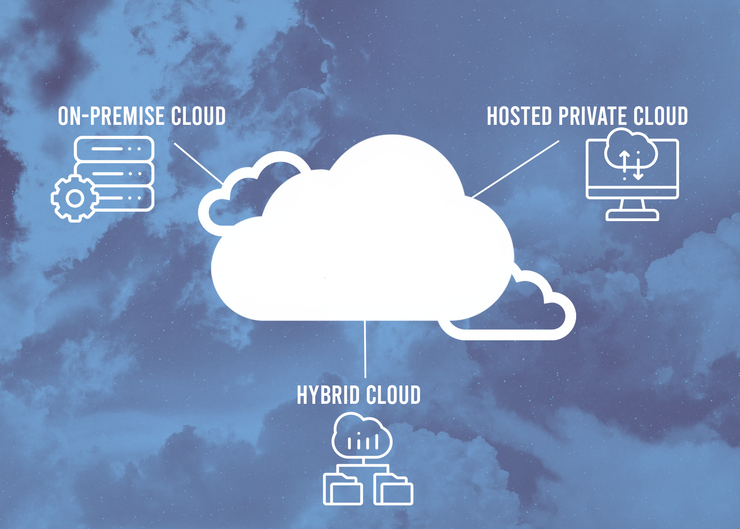Blog
What's the Difference? On-premise vs Hosted vs Hybrid Cloud Solutions
February 7, 2021
February 7, 2021

An On-premise Cloud is when your business keeps the data servers within the organization and manages them internally. Hosted Clouds are when you pay a software provider to manage your data externally. A Hybrid Cloud is a mix of both, when data servers are still located within the organization but shared among other locations within the organization through the cloud.
When considering which cloud system is best for you, there isn't just one right option for your business. This choice compeltely depends on the needs and goals of the company. Each system has its own benefits and are uniquely implemented and deployed best fit for every company.
Having an On-Premise Private Cloud system requires that a company has their servers and data stored at their own location or office. Organizations that choose this route will have an in-house cloud data stack server. This is probably the least recommended of the three options, as businesses must then manage and ensure the security of their own data. But, this would be a good option for companies who have an internal team of IT experts who can manage and secure your company's data on your own. It's more than likely that if you are not in the IT field of business, then you will want to focus your efforts on your core responsibilities, not managing and organizing your data. This option is also preferred by companies who only have one location or the largest of organizations. With the growth and digital transformation of ERP systems over the past decade, this is the most outdated of the three.
Hosted Private Clouds consist of using a cloud provider, someone who provides Software as a Service (SaaS), to host your data servers in their own personal data center or cloud. This means that you have an external team of experts who manage your platform for you, which really only requires you to send out help desk tickets if there is a request for change or an issue with your system. This also means that the service provider is responsible for all of your data and the security of that data. Most SaaS providers use larger systems to provide this to their customer's, such as SAP, AWS, Microsoft, etc. You save money by only having to pay for the software, not the hardware that runs these systems externally. This is likely what comes to mind when you think about our company, Approyo.
Paying for cloud solutions can be a cost-effective option, considering they are often subscription-based. One thing you want to look out for is the security of their network though. Make sure that your data is in the right hands and is secure at all times. You also will want to learn about how they go about providing their services and the timeliness of service as well.
There's also a third option, which is hybrid cloud. As you can imagine, this choice is a mix of both on-premise and hosted private cloud solutions. You can keep some of your servers in-house, but use a hosted cloud software to manage your data and disperse your information among other locations. To give you a better picture, it's like being able to communicate with the rest of your company by phone, but through a cloud platform instead. Data is able to be shared from public to private cloud environments, its the most flexible of all options. This is good for companies who are looking to add applications or mobility to their current on-premise system or looking to move services to a web-based software.
We are an SAP cloud solutions provider, offering all solutions to customers with SAP systems. If you are looking to move to the cloud or looking to migrate to a new solution, we will help you everys step of the way. With our global team of SAP experts, we are able to provide 24/7 support with our managed services whether it be on-premise, hosted or a hybrid system. Schedule a complimentary consultation with our team to see which type of system works best for your business.